American Innocence
"The Golden Bowl" and "The Age of Innocence"
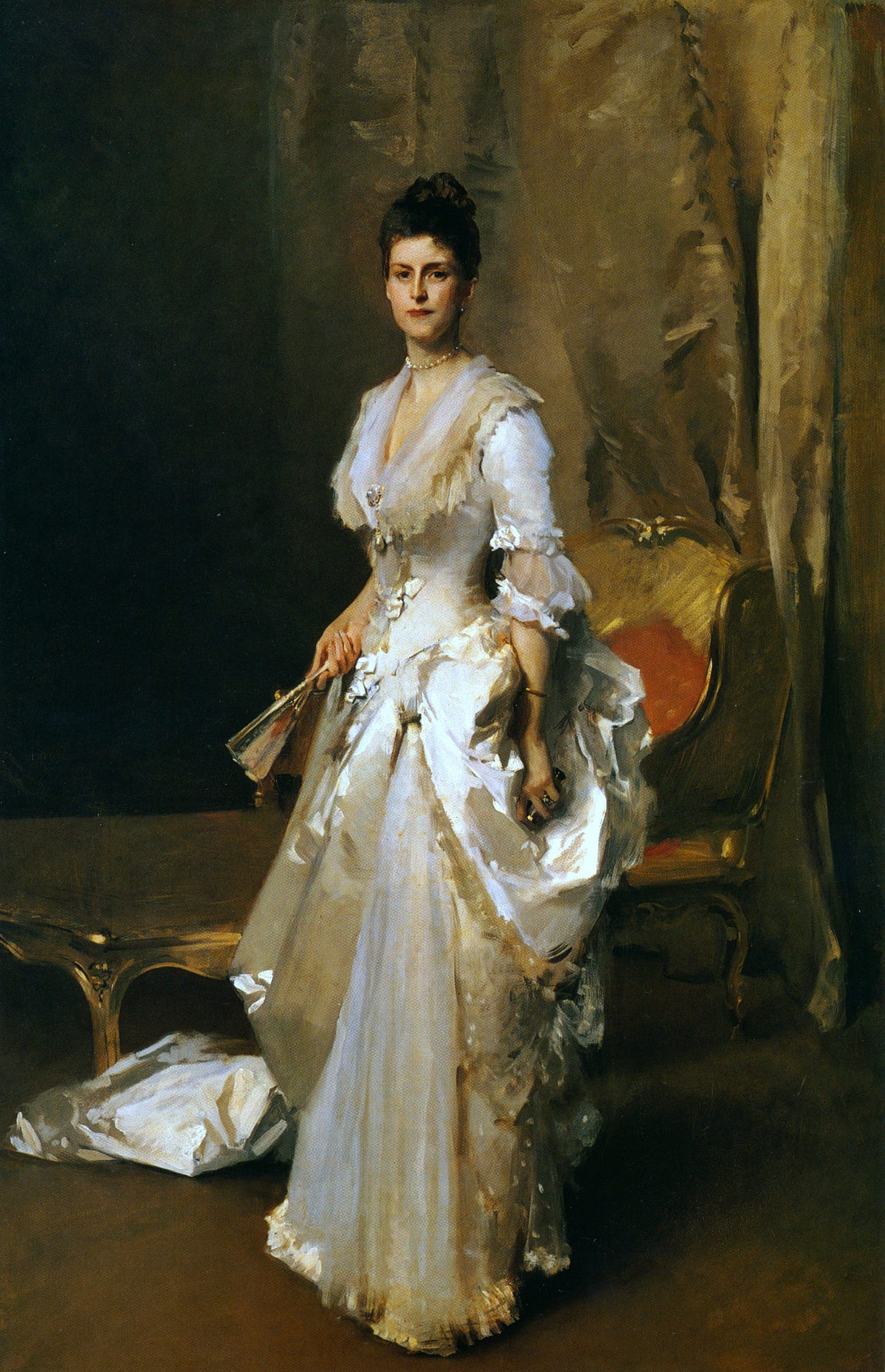
There is nothing more beautiful than a prospect of pure, unspoiled snow, and there is nothing more fun than to walk across it, step in it, stamp on it, kick it, pack it, throw it, ruffle it. “It all comes back to that, to my and your ‘fun,’” Henry James tells us archly in the preface to his 1904 novel The Golden Bowl. But The Golden Bowl is written in a style so dense and convoluted that any notion of “fun” may be the furthest thing from your mind when you read it. It is a book that makes the brain feel all wobbly around the edges, like custard.
At the opening of Bleak House, Charles Dickens describes fog blanketing landscapes and rolling down rivers, fog settling over marshes and clouding moors, fog sailing in on ships and setting out on barges, fog ruining the respiratory systems of wheezing geezers and pinching the toes of young “’prentices,” fog drooping, creeping, falling, looming, mystifying the world with its great gauzy scarves of mist. He traces this fog to the High Court of Chancery, seat of obfuscation and complication. In The Golden Bowl, fog, too, is general, but what it pervades is the text, not the streets of London, and its source is James himself, seat of obfuscation and complication.
One may explain this fog by pointing to James’ personality, to his preference as a writer for labyrinthine elaboration and baroque complexity, to the fact that the novel was not actually written, in the strictest sense, by James, but rather dictated, like Milton’s Paradise Lost, or to the fact that it was written during James’ last, third phase as a novelist (rehearsing, of course, the old joke of naming these phases “James I,” “James II,” and “The Old Pretender”). “Pretend” is actually the operative word here; it happens often in the novel, and its action is perfectly suited to James’ prevaricating words.
A quick rundown of the plot: a rich young American woman, Maggie Verver, and her rich American industrialist father, Adam Verver, are in London for Maggie’s wedding to the cash-poor but status-rich Italian Prince Amerigo, whom Adam has “bought” for his daughter. Unbeknownst to Maggie or her father, the Prince once had a relationship with Maggie’s childhood friend, Charlotte Stant, but—she being as impoverished as he—the two failed to marry. Charlotte rematerializes on the eve of Maggie’s wedding, ends up marrying Maggie’s father, and what is set in motion is a kind of backwards Elective Affinities, where the chemical reaction AB + CD = AD + BC must be reversed.
James explains his novel as operating by a “rotary” motion, a “vicious circle.”1 Fanny Assingham, who set Maggie up with the Prince in the first place in spite of being fully aware of his romance with Charlotte, gives us a fuller picture of this “vicious circle,” explaining it to her husband Colonel Bob Assingham (Fanny and Bob function as stand-ins for James and the reader). First Maggie has to “make up to her father” for having become “so intensely married.” Then she has to “make up to her husband” for spending so much time with her father; this she accomplishes by “allowing the Prince the use, the enjoyment, whatever you may call it, of Charlotte.” This, in turn, has the result of taking her father’s new wife from his side, so to make up for that, Maggie is “saddle[d]… with a positively new obligation to her father, an obligation created and aggravated by her unfortunate, even if quite heroic, little sense of justice.” So the circle turns and turns, and Maggie and her father go off blithely to enjoy the same father-daughter chumminess they’ve always enjoyed, and Charlotte and Amerigo tryst in wayside inns, and Fanny Assingham gossips about it all to Bob Assingham, and everyone lies and lies.
The first part of the novel is told from the perspective of the Prince, but really most of the novel is from Maggie’s point of view, and it is Maggie who is our main character. She is a more interesting heroine than we—and the Prince and Charlotte—can appreciate at first, and that is mainly because everyone underestimates her. For the Prince and Charlotte, Maggie and her father can be nothing but good and innocent. “I can feel that I’d do anything—to shield [Maggie’s skin] from a bruise,” Charlotte says to the Prince. Adam, too, is “in truth of a sweet simplicity—!” So they vow to lie, to take “a conscious care” that their affair does not get back to their respective sposi, and “with a violence that had sighed itself the next moment to the longest and deepest of stillnesses they passionately sealed their pledge.” But little by little, little Maggie Verver is in the background gathering up the clues, sniffing out the lies, reading between the lines of the fragments and half-sentences everyone speaks in. She becomes gradually aware of “the horror of the thing hideously behind, behind so much trusted, so much pretended nobleness, cleverness, tenderness.”
But her object above all is to keep this from her father. It was she, after all, who encouraged him to marry, it was she who introduced him to Charlotte, it was for her sake that he married. I suspect that Maggie’s father is much more clever, much more knowledgeable than Maggie and the others believe him to be (how else could he have become as wealthy as he is, or as reputed an art collector, if he were not a shrewd businessman?), and also much less simple and innocent. It is “for his daughter,” so that his daughter does not feel any guilt of having placed him in an unhappy situation, that he pretends he does not “so vividly see,” just as he marries so that she does not feel she has abandoned him. Father and daughter have a circumlocuitous conversation in the garden. They understand each other. The result is that Charlotte and Adam will sail back to “American City,” while Maggie and Amerigo will continue to live in London. The threats to their marriage shipped off, husband and wife, Prince and Princess, can now, at last, safely turn to each other.
Critics complain that James’ symbolism of the golden bowl is too heavy-handed to be elegant, but in a world built on evasions and insinuations, can one wonder that metaphor is mighty? On the eve of Maggie’s wedding, Charlotte asks the Prince to accompany her to find a wedding present for Maggie. They end up in the shop of an antiquary, who offers them an old, golden bowl, a bowl of gilded crystal. Amerigo instantly sees that it “has a crack” and dissuades Charlotte from buying it:
“Per Dio, I’m superstitious! A crack is a crack—and an omen’s an omen.”
“You’d be afraid—?”
“Per Bacco!”
“For your happiness?”
“For my happiness.”
“For your safety?”
“For my safety.”
She just paused. “For your marriage?”
“For my marriage. For everything.”
Later, four years later, Maggie decides to walk home one evening and pauses at the same antiquary’s shop, thinking to get a birthday present for her father. The antiquary shows Maggie the golden bowl, and she purchases it. She doesn’t notice the crack. Regretting that he has overcharged her and failed to point out the flaw, the antiquary drops by Maggie and the Prince’s home to personally deliver the bowl. While at their home, he sees photographs of the Prince and Charlotte and recognizes them as the striking couple who had almost bought the bowl. The pair had spoken Italian, but he happens to understand Italian. How unforgettable this couple, how close and how intimate!
That day he reveals not only that there is a crack in Maggie’s bowl, there is a crack in Maggie’s marriage. The bowl is gilded, not gold; the marriage is gilded, not gold. Crystal does not break like glass, but it can split “on lines and by laws of its own.” Before they all go out for dinner, Maggie calls for Fanny Assingham, tells her what she has learned, points out the flaw in the gilded crystal. “I want a happiness without a hole in it…. The golden bowl—as it WAS to have been…. The bowl without the crack.” In the novel’s most violent scene, Fanny holds the bowl up and drops it to the marble floor, as though dropping it, destroying it, sweeping it away, will simply drop and destroy and sweep away the affair:
“Or ever the silver cord be loosed, or the golden bowl be broken, or the pitcher be broken at the fountain, or the wheel broken at the cistern. Then shall the dust return to the earth as it was: and the spirit shall return unto God who gave it. Vanity of vanities, saith the preacher; all is vanity.”2
To anyone looking from the outside in, the tale of this claustrophobic but gilded foursome, ensconced in the Ververs’ wealth, going from city house to country house, from country house to city house, playing cards, paying visits, lying and deceiving and hiding and dissimulating—it all really does look like “vanity of vanities.” But for Maggie Verver, on the inside, to let the broken bowl be broken is unthinkable, unbearable. She picks up the pieces. Anybody can break a bowl, but it takes a certain special skill to mend one.
Maggie Verver reminds me of the similarly named and similarly underestimated May Archer (née Welland) of Edith Wharton’s The Age of Innocence, published 16 years later in 1920. May is not the novel’s main character; in fact, she seems rather peripheral to the requited but unconsummated love between her fiancée, then husband, Newland Archer, and her cousin, Countess Ellen Olenska. The novel is basically a history of his blunders; as my husband remarked, watching the excellent Scorsese adaptation with me, he “takes an L in every scene.” In that way it operates on a principle similar to James’ “rotary” motion, where one mistake spawns another, which has to be covered up by yet another, which only reinforces the original mistake.
Because Ellen’s separation from her husband brings an unwelcome whiff of scandal to his fiancée’s family, Newland feels he must waft it away by announcing his engagement to May as soon as possible. To continue this project of endorsing Ellen for his fiancée’s sake, or so he thinks, he visits her, sits with her, talks to her. He tells her not to go through her divorce and puts in a request to the mountainous, mighty matriarch of his fiancée’s clan for a hasty engagement period. But just when he and Ellen realize their feelings for one another, a telegram comes in like a clap of thunder, stating that his and May’s wedding will take place within a month. He runs after Ellen, then runs away to May. There is still possibly a window in which he might break off his engagement, but he goes through with the wedding. This way and that way, then, he attempts to loose the fetters of matrimony, but his new wife is smarter than he suspects, and society itself—of which his wife is simply the ideal figurehead—is smarter than he suspects, and so May, by revealing her pregnancy, manages it so that Ellen will be shipped off to Europe, will be given independent means, will not have to return to her dreaded husband, but will be out of May’s hair and out of May’s marriage. Newland now, dream as he might, cannot travel—to Europe or anywhere—without bringing his pregnant wife along with him. His wife’s “blue eyes,” into which he has looked so many times and seen only surfaces, shine “wet with victory.”
Always for him May has been blank, smooth, simple, incurious, unimaginative. Twice he looks at her with “the simple joy of possessorship,” with “a thrill of possessorship in which pride in his own masculine initiation was mingled with a tender reverence for her abysmal purity.” He, with the great education that being male has afforded him in this society, thinks with a benevolent condescension of how he might expand May’s mind, introduce to her the great works of literature, throw open vistas “which it would be his manly privilege to reveal to his bride.” He laments the plight of “‘nice’ women” of his class who do not “speak for themselves”; he sees them as having “bandaged eyes,” or eyes like those of “the Kentucky cave-fish, which had ceased to develop eyes because they had no use for them.” He thinks that even if he were to remove the bandage, these eyes would “only look out blankly at blankness.”
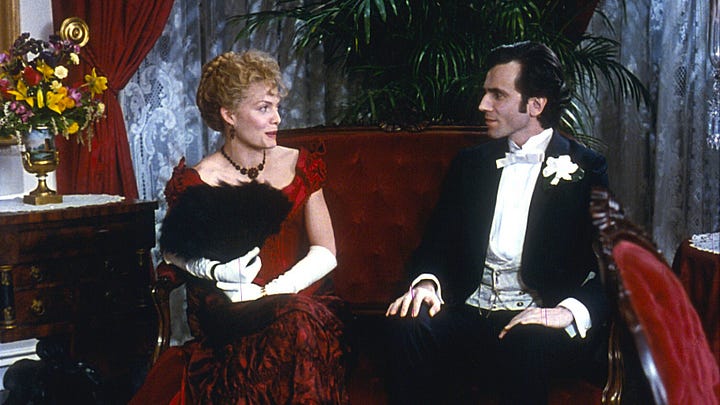
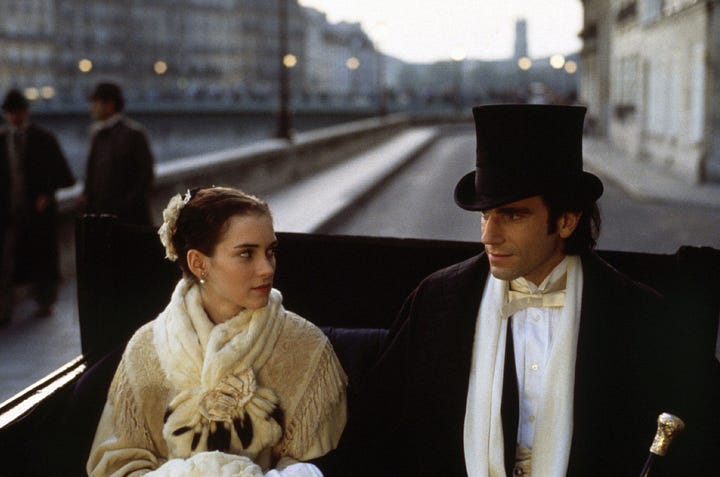
But May’s final masterstroke reveals her social and emotional genius. Poor Newland is somewhere stumbling around, blundering, floundering, falling into traps, all the while thinking himself so much smarter, so much more advanced, so much more evolved than the people around him. Meanwhile, May with her blank look and blank simplicity and “blank” questions is playing a game so subtle he can’t even see where he is on the board. It is only near the end of the novel, when May is hosting, triumphantly, a farewell dinner to send her cousin Ellen off to Europe, that Newland realizes that
The silent organisation which held his little world together was determined to put itself on record as never for a moment having questioned the propriety of Madame Olenska’s conduct, or the completeness of Archer’s domestic felicity…. from this tissue of elaborate mutual dissimulation Archer once more disengaged the fact that New York believed him to be Madame Olenska’s lover. He caught the glitter of victory in his wife’s eyes, and for the first time understood that she shared the belief.
Both James and Wharton were friends, both were chroniclers of the lives of upper class Americans, and both were expats. Expats are better at understanding their native country; distance, geographical or emotional, enhances understanding. With distance one sees the whole picture and the picture frame, one sees the wall where the picture is hung, one compares the picture with the others hung in the gallery and notices perhaps that brushstroke, this flaw. Just as Joyce left Dublin but his imagination could not, so, too, had James and Wharton left America and Americans only to write about them with a renewed depth and verve.
Maggie and May are portraits of a certain type of American womanhood, embodiments of a certain type of American virtue. We may see them as morally bad, or at least gray, for separating two lovers, trapping their husbands (and themselves) in marriages that are not wholly happy. Yet the endings of their two novels present them as triumphant, embodiments of the winged goddess Nike, or if chaste Diana, Diana the huntress who hits her mark straight through the heart. Whatever we may think of the domestic sphere they defend, they are successful in its defense; they manage to fend off foreign threats to American morality.
For it is no accident that their romantic rivals are Europeanized Americans. Charlotte Stant spent her childhood in Florence and speaks perfect Italian, an Italian that the Prince “had known neither man nor woman who showed for it Charlotte’s almost mystifying instinct.” Ellen, meanwhile, spent many of her formative years in Europe, married a Polish count, and often shows an ignorance of American conventions and unspoken norms. Both of them suggest sexual experience and a kind of European worldliness—an instinctual kinship with art and culture and good conversation and bohemian je ne sais quoi. When Adam takes Charlotte back with him to American City, we feel that she is just another one of the Old World objets d’art he brings back with him, one of the fine paintings or marble sculptures, to be shut up in what will be for her less a museum than a mausoleum.
Where the Europeans differ from the Americans in the way that matters is morally. Europe is a land of experience, America of innocence. The Americans are content to enjoy—want to enjoy, with all their wealth—all the fruits of European culture, in however bastardized a form (think of the performance of Faust Newland watches at the opera house, German sung in Italian for an English-speaking audience), and at the same time cut out the canker in the apple, the rot in the fruit they see as slack European morals. “We haven’t got it—not as you have,” Prince Amerigo, woefully Italian, tells Fanny Assingham of the moral sense,
“I mean, always, as you others consider it. I’ve of course something that in our poor dear backward old Rome sufficiently passes for it. But it’s no more like yours than the tortuous stone staircase—half-ruined into the bargain!—in some castle of our quattrocento is like the ‘lightning elevator’ in one of Mr. Verver’s fifteen-storey buildings. Your moral sense works by steam—it sends you up like a rocket. Ours is slow and steep and unlighted, with so many of the steps missing that—well, that it’s as short, in almost any case, to turn round and come down again.”
We can contrast this with Edith Wharton’s characterization of old New York society, which she recollects from her childhood in A Backwards Glance. Though this society had a few families who “could show a pedigree leading back to the aristocracy of their ancestral country,” the origins of most families lay in “a mercantile middle class”; it was primarily a “commercial community” who felt it tantamount to uphold a “scrupulous probity in business and private affairs.” New Money though he may be, Adam Verver, coming from the archetypal “American City,” is the archetypal American businessman, an inheritor of this American moral tradition. James compares his face to a “small decent room, clean-swept and unencumbered with furniture.” He dresses, “every day of the year,” the same way, and he keeps his “unfathomable heart” behind “the constant flawless freshness of [his] white waistcoat.”
Everyone in the novel wrings their hands so much about what Adam Verver may or may not know, how—as though he is a frail old man and not the sprightly 47-year-old that he is—to protect him, how to cover his ears, how to keep him ignorant and therefore innocent. It is true that he mostly seems to recede into the background. Yet he has mastered the skill of knowing without seeming to know, saying without speaking, maneuvering without moving, a skill his daughter learns over the course of the novel, a skill May has from the beginning of The Age of Innocence. The Maggie version of What Maisie Knew would be What Maggie Knew, but the May version would be Does May Know?—a delicious ambiguity that is ever fruitful.
Reticence, blankness, innocence—these are survival skills. The surface of the fruit remains unspoiled and golden as ever, but underneath it something is ripening, something is maturing. One must cast off the rosy romantic ideal, the girlish, childish quest for the Holy Grail that is the bowl never broken. Like Newland Archer, Maggie comes to see that “marriage was not the safe anchorage [s]he had been taught to think, but a voyage on uncharted seas,” that faith cannot be “divided… into water-tight compartments” after all. Life is no flawless crystal; its cracks are its “lines and laws.” Moral perfection is impossible, for there is always some sacrifice, some compromise we must make, some invisible flaw we must allow for in order to possess the beautiful object. Maggie cannot fulfill her duties as a wife without a painful rending from the father who is like a second self to her, nor without hurting her childhood friend, nor even her husband himself, who must become indifferent to a woman he was once intimate with.
Maggie begins the novel as a moral idealist and ends it as a moral pragmatist. May, too, I think, is a moral pragmatist, and makes the best choices she can in her circumstances, though they are necessarily imperfect ones. Before her wedding with Newland, she is shrewd enough to detect that something is “off” about him and gives him an out—if there is someone else, she tells him, she wants to know: “You mustn’t think that a girl knows as little as her parents imagine.” If her fiancée loves this other person, she will relinquish her claim on him, she won’t get in the way of “two people [who] really love each other,” she is even, against her upbringing and her training, willing to approve that these two people “should go against public opinion.” All this, as she tells him, because “I couldn’t have my happiness made out of a wrong—an unfairness—to somebody else.”
But it is Newland who messes up, who does not have the emotional awareness to know what he feels and the moral strength to choose private feeling over public opinion at the moment it would cause the least damage to others. He doubles his mistake by doubling down on the necessity for a sped-up engagement. Once married, divorce is simply not an option in this society. So the best choice May can make is to banish her rival with as much dignity as can be managed, which is as much as Maggie does in The Golden Bowl. Nothing is broadcasted or made public about Newland and Ellen, allowing them (and May) to escape shame and embarrassment. Ellen is not sent back to the husband she hates; she can have Paris and conversation and art and beauty. Charlotte Stant, too, though doomed to be shut up in the airless, artless America, will be the wife of one of its richest denizens, which is not such a bad fate for someone who had been willing to give up love for pecuniary reasons in the past.
I admire the subtlety and the cunning with which these ends are achieved. Before the final coup de grâce, both women go to confront their rivals. May reveals her pregnancy to Ellen, a revelation that makes it morally impossible, especially in this time and this society, for Ellen to “take” Newland away from May. Later May unfolds another revelation, to Newland, that she had done this before she was really sure of her pregnancy—she had told a lie.
When Maggie confronts Charlotte in the garden, she, too, tells a lie. Charlotte tells Maggie that she is “tired,” tired of the life that all of them have been leading, the life in which Maggie and her father’s intimacy leaves Charlotte to sort for herself. Maggie leads Charlotte on with a series of “innocent” questions; “her chance somehow was at hand,” and she takes the chance, attempting with every step of conversation “to follow the right line.” When Charlotte says that she knows what “[her] difficulty” is in making a “definite break” from Europe, Maggie feels, “far down below the level of attention, in she could scarce have said what sacred depths,” a flash of inspiration, and asks ingeniously, “Do you mean I’M your difficulty?” She plays her role perfectly, deliciously perfectly. With a “sharp, successful, almost primitive wail,” she adds, “You want to take my father FROM me?” Charlotte’s reaction confirms “for the Princess the felicity of her deceit.” The trick is that, in making Charlotte believe that she (Maggie) wants to cling on to her father, that she “loathe[s]” the marriage between her father and Charlotte, she inflames Charlotte’s desire all the more to save her marriage, which cannot be done without saving Maggie’s marriage. “You recognise then that you’ve failed?” Charlotte asks Maggie, thinking that what Maggie wants is to drive apart Charlotte and Adam. But what Maggie wants is to drive apart Charlotte and Amerigo. “I’ve failed!” Maggie replies, her victory complete. “Yes,” James confirms for us, “she had done all.”
All this is always conducted with scrupulous tact. Feelings may roil and boil, but no one is made to be publicly humiliated, scorned, or shamed. Losers are made to believe they’ve won, or at least given the face-saving of graceful defeat. Such games of tact and reticence, lying and manipulation, are largely women’s games. “I see it’s ALWAYS terrible for women,” Maggie says to her husband. The wife is cheated on; the mistress is callously cast off. In the absence of overt power, power must take covert forms, fighting its battles in the drawing room, the ballroom, the garden. As defenders of the moral sphere, women are supposed to be innocent; they are cosseted, coddled, kept in the dark; their sexuality, without which they cannot fully win the love of their husbands, is repressed. And yet their task requires that they not be ignorant: to drive out a snake lurking in the garden, one must first see it.
Sometimes I find myself filled with a strange nostalgia for this social world of such subtlety and such subterfuge, this “hieroglyphic world, where the real thing was never said or done or even thought, but only represented by a set of arbitrary signs,” and yet its moral trade-offs make me uncomfortable. I hate lying and yet I love reticence; I hate manipulation and yet I love tact. In this world a woman must have both the businessman’s “scrupulous probity” and his smarts. She must be a savvy trader in the commerce of words, in the market of emotions, but her wins cannot come at the total expense of another’s, for then the whole market would collapse; business would not be possible.
The Europeans in these stories are immoral (think of poor Ellen’s dastardly Polish count of a husband) or at least amoral; they experience life, life diverges from morals, they cast off morals. But the Americans at least seek to maintain the form of morals; they experience life, life diverges from morals, they try to effect a compromise between life and morals. Eaton Square where Maggie and the Prince live cannot be Eden—Adam gone from it, whisking away the serpentine Charlotte—but with the variance of a few letters it is as close as we may get in our fallen, our dropped bowl of a world. In Amerigo Vespucci’s time, the Old World colonized the New; in Prince Amerigo’s time, the New World colonizes the Old. “I see nothing but you,” Amerigo says to Maggie at the end of The Golden Bowl. So, too, in both novels, does the woman colonize the man, and the effects of it are difficult to look at in the face: “And the truth of it had, with this force, after a moment, so strangely lighted his eyes that, as for pity and dread of them, she buried her own in his breast.”
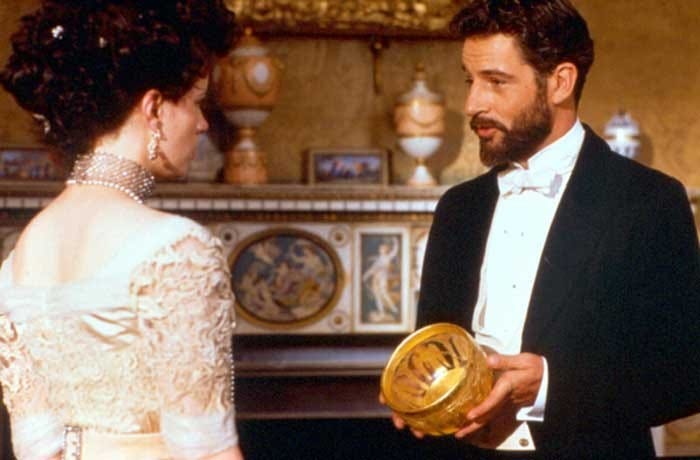
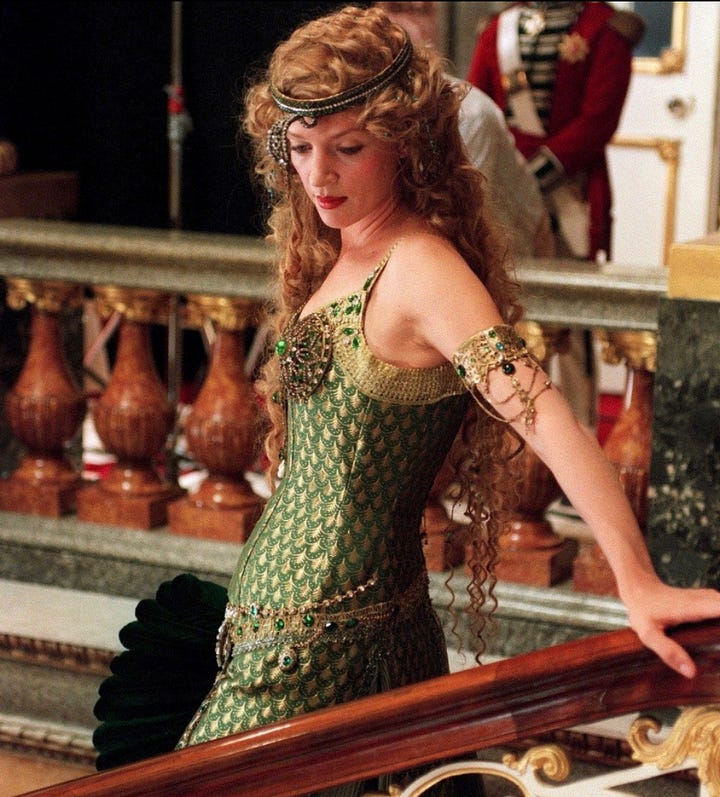
“Pity and dread,” yes, but not enough to swerve her from her mission. “He didn’t undertake to break down…. He had never in his life proposed to himself to have failed,” Fanny Assingham says of Maggie’s father, and the golden fruit does not fall far from the golden tree. Winning—this is a consistent pillar of American values, but Maggie and May, I think, love and respect the game, not just the victory. Now the game is gone, for this society is gone. It has its drawbacks, but it has its beauty, too. Its fascination, Wharton reflects, lies “for the imaginative few in the recognition of the moral treasures that went with it.”
Today, in a society where we are encouraged to “communicate,” where so much is exposed, exhibited, explicit, we may not fully appreciate such “moral treasures.” But I think Wharton is right in making a connection to the imagination. Fiction is a lie, but a lie that reveals the truth more than the truth itself would reveal it. What would be the point of fiction, would fiction even be possible, if everyone were able to say everything and know everything? Wharton masks knowledge by employing as her narrative vessel Newland Archer, who is always one step behind; James masks knowledge by the fine, silken spirals of words he weaves. Maybe it all really does come down to that, in the end, “to my and your ‘fun.’” Thank goodness there are “cracks in things that we don’t know.” Were we to know all the cracks and all the flaws, we could “never then give each other anything.” Ah! but we don’t know the cracks, and we are given to and given to, and our bowl runneth over, and our fun is endless.
Dear Readers, this essay is a bit longer than usual, but I hope you’ve enjoyed it! If you did, please like this post and share with a friend. And if you’ve read either of this books, I’d love to know your thoughts in the comments!
from The Complete Notebooks of Henry James
Ecclesiastes 12.6-7




I enjoyed your essay so much! Most of the reflections I’ve read on Age of Innocence see May as a bit dim, but she is sharp, subtle, clever, and (I waffle on this), either very kind or very selfish. She is either in love with Newland and acts to protect his happiness by arranging things cleverly to keep him out of danger, or not in love with him but has settled on him as her path to social success, money, etc - everything her society values. I agree with you about life today missing those amazing details where so much can be conveyed by unbuttoning a glove. But we have modern dentistry and excellent home coffee machines, so I guess on balance I prefer today. ;-)
“In this world a woman must have both the businessman’s “scrupulous probity” and his smarts. She must be a savvy trader in the commerce of words, in the market of emotions, but her wins cannot come at the total expense of another’s, for then the whole market would collapse; business would not be possible.”
Woman’s work. Exhausting, no? Has that changed much since James’ and Wharton’s time?
Thanks for holding up the flag of the long form essay here on Substack, Ramya!